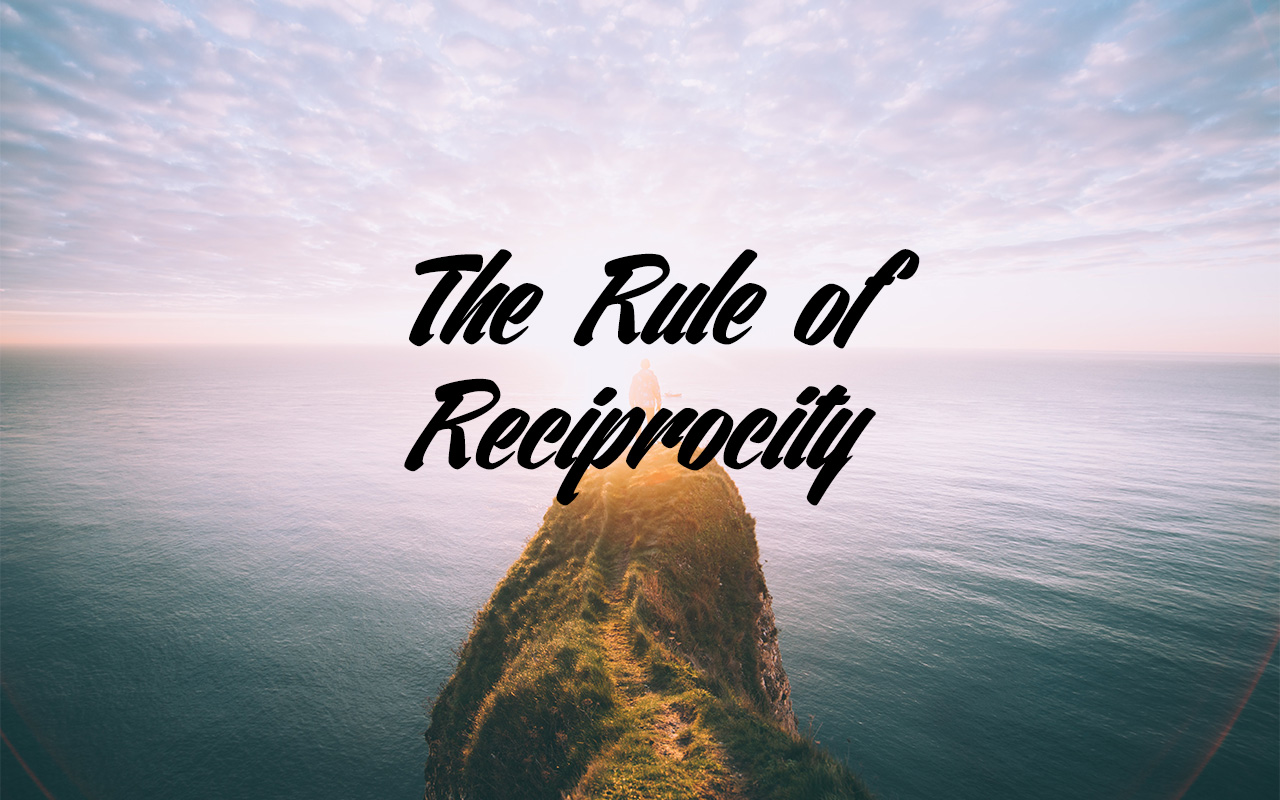What is Reciprocity?
The rule of reciprocity is a term used in social psychology, popularised by Robert Cialdini Ph.D., Which states simply that by doing something nice, others will feel compelled to do something equally as nice for if not greater. Similarly, do something bad and others will react equally if not greater. It works both ways, and in business, is a technique used in long-term relationship building and marketing.
If people receive something that they attribute a large amount of value to, they feel compelled to repay you in a large way.
The technique is used a lot by independent creatives, freelancers, entrepreneurs and business owners. Think of the successful bloggers, designers, movie-makers of which you consume their content on a daily basis. Think of the things that they have (inevitably) given away for free, with in terms of education or entertainment. This is the rule of reciprocity, they give away free content that you deem valuable, and in exchange you feel compelled to repay them in some form.
Whatever the form of the value takes, it could be industry specific such as free fonts for designers, templates for web designers, Lightroom presets for photographers, textures for illustrators, or could even be educational value like podcasts or video shows. Whatever it may be, find the thing that people in your industry want, make the best version of it, and give it away for free. This is how you build an audience for that thing. For some people it’s all about the timing and when they receive this thing you’re giving away for free. Make sure you give away the best version of it and if it hits people at the right time, just as they were looking for it, they will feel obliged to repay you in the future for it.
The quality is a multiplier of the reciprocity.
Reciprocity goes hand in hand with building an audience, but most importantly, relationships. Without starting a relationship with the people who are getting your thing for free, you will remain anonymous to those people. Making it easier for them to take from you without giving anything in return for the free value you provide. To solve this, ask people to reach out to you, give them a CTA (Call-To-Action) where you ask them to answer or comment on their thoughts to a particular blog post, or to reach out and email you with similar problems that they experienced in response to a blog you posted, or how the free content is effecting their life/work. You could have a sign-up list where you give exclusive content away for free. Once they sign up, ask them to reach out.
It’s all about making relationships with the people who are receiving your valuable content that you are giving away for free.
You must not remain anonymous. Like I mentioned above, without a face to attribute to, there is less of a human element involved. People want to feel like they are interacting with another human on the other side of their screen. This is why businesses create mascots. To humanise outward appearance and connect with people on an emotional level. To combat the anonymity, you should have your face on your social media profiles, email profile, website, anywhere there is a space available put your face in it.
Reciprocity works when you are not expecting anything in return, because when you expect something from a piece of content and it doesn’t deliver on those expectations, you can feel set back from it, wondering why it went wrong or why someone didn’t take action on following up because you gave something away for free. There are going to be freeloaders who will take everything away for free, but these people are not your target audience. There were never going to be, and they never will be. The more you put out and the larger you grow in terms of audience, the more you realise how many people actually appreciate the work you produce and the valuable content you receive they receive for free.
Everybody is on a different stage of the buyers journey, both those in your audience and those not. Someone may stumble across your website / store, and buy something because it was exactly what they were looking for at that time and your landing/product page sold it to them convincingly. Others may be a few steps behind, maybe on the fence, these people are the most important and this is where reciprocity is key. The more value you produce for these people to use for free, the more reciprocity you are building up, think of it like brownie-points.
You have to be willing to out-give the next person. But not to give away something that is not valuable, the quality must be exceptional in terms of industry standards.
If you start to charge for something that was free at one time and you have people complaining that you are now charging for it. These are the wrong type of people who were freeloading off the back of your free, valuable content. They were never going to buy from you and are not mad that they can’t enjoy the free content that benefited them so much to begin with. This isn’t your problem, it’s a problem with freeloaders expectations.
Over-deliver on something you say you had planned to give away for free and the effect of reciprocity will double in your favour. Be prolific at what you do and provide the highest industry standard content for free. Be niche in your market, but broad in your approach. What I mean is, provide something that is hard to obtain without paying for it first, or provide the means to learn what would normally have taken a long time.
This is why you should read more books/ebooks. Books are a form of condensed knowledge. And ebooks are mostly given away for free. You see them all the time on independent blogs, websites etc. ’10 ways to improve your health’ from a health food blog. Collect them, dedicate time to read them.
All this being said, reciprocity is not some business jargon, or slang for making money. It’s a term used in social psychology. Yes, it is useful for making money and establishing relationships in the long run. But it can apply to many real life situations. Most notably, dating scenarios. When someone offers to pay for the meal (as courteous as this is), this is reciprocity at work, the recipient then feels compelled to return something equal or greater to that person, ie. heightens the chance of a another date.
The more specialised you are in your market, the more of an audience you can build from those seeking this very specific thing, granted the more specific you are the more you can rule out of your potential audience. But the easier it will be to create meaningful relationships with those people who really matter and who get genuine value for the content you produce. Be on as many social media outlets as you can maintain at a time, but don’t spread yourself too thin, reach out to people on those platforms and post regularly to maintain relationships.
Always be asking yourself; is this person asking something from me, or are they giving me something?



